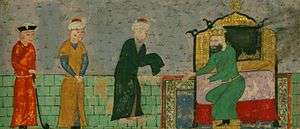Qizil Arslan
Muzaffar al-Din Qizil Arslan Uthman (Persian: مظفر الدین قیزیل ارسلان عثمان), better known as Qizil Arslan[a] (قزل ارسلان), was the ruler (atabeg) of the Eldiguzids from 1186 to 1191. He was the brother and successor of Muhammad Jahan Pahlavan, and was later succeeded by his nephew Nusrat al-Din Abu Bakr.
| Qizil Arslan قزل ارسلان | |
|---|---|
| al-Malik al-Mu'azzam | |
 Miniature of Qizil Arslan welcoming the Persian poet Nizami Ganjavi. | |
| Atabeg of the Eldiguzids | |
| Reign | 1186–1191 |
| Predecessor | Muhammad Jahan Pahlavan |
| Successor | Nusrat al-Din Abu Bakr |
| Died | August or September, 1191 |
| Father | Eldiguz |
| Religion | Sunni Islam |
Background
Qizil Arslan was the son of Eldiguz, a Kipchak military slave of the Seljuk Empire, who rose to prominence and established the Eldiguzid dynasty, and from 1160 had managed to make the Seljuk Sultan of western Iran his puppet, thus taking control over most of western Iran.[1] However, during the reign of his son and successor, Muhammad Jahan Pahlavan (r. 1175–1186), the dynasty was weakened and lost many of its territories, retaining only control of Azerbaijan and Arran. During this period, Qizil Arslan was in charge of Tabriz and its surroundings.[1]
Reign
Qizil Arslan ascended the throne in 1186 after Jahan Pahlavan's death, and assumed the title of al-Malik al-Mu'azzam ("the respected king").[1] However, Qizil Arslan immediately came in a conflict with a faction under the leadership of Jahan Pahlavan's widow Inanj Khatun who supported their two sons. Meanwhile, the Seljuk sultan Toghrul III (r. 1176-1194), who had been a mere figurehead under Jahan Pahlavan, freed himself from the grip of the Eldiguzids and withstood them until he was seized by Qizil Arslan's men in 1190, and shortly afterwards imprisoned.
Qizil Arslan initially declared the newborn Seljuk prince Sanjar ibn Suleiman-Shah as sultan, but then chose to declare himself as sultan. The following year, however, he was found murdered on his bed, most likely at the instigation of Inanj Khatun.[1] Qizil Arslan's nephew, Nusrat al-Din Abu Bakr, instantly took action after his uncle's death, and ascended the Eldiguzid throne, whilst Inanj Khatun and her two sons were fighting over the control of Persian Iraq with Tughril III, who had managed to escape from imprisonment with the help of Kamal al-Din Abhari.[1][2]
Court life
Like the rest of the Eldiguzids, Qizil Arslan was an advocate of Persian culture and literature. The poet Athir al-Din Akhsikati, who played a prominent role in the history of Persian poetry, replaced Mujir al-Din Baylaqani as Qizil Arslan's court poet. The prominent poet Khaqani, who had moved from Shamakhi to Tabriz, also became acquainted with Qizil Arslan, and composed poems appreciating the latter. Another poet, Nizami Ganjavi, who is considered the greatest romantic epic poet in Persian literature, dedicated his Khosrow and Shirin first to Muhammad Jahan Pahlavan, and then later to Qizil Arslan.[1]
Notes
^ a: Qizil Arslan is a Turkic name, meaning "red lion".
References
- Luther 1987, pp. 890–894.
- Bosworth 1982, p. 217.
Sources
- Bosworth, C. E. (1982). "Abharī, Kamāl-al-dīn". Encyclopaedia Iranica, Vol. I, Fasc. 2. p. 217.
- Luther, K. A. (1987). "Atābakān-e Adharbayjān". Encyclopaedia Iranica, Vol. II, Fasc. 8. pp. 890–894.
| Regnal titles | ||
|---|---|---|
| Preceded by Muhammad Jahan Pahlavan |
Eldiguzid ruler 1186–1191 |
Succeeded by Nusrat al-Din Abu Bakr |